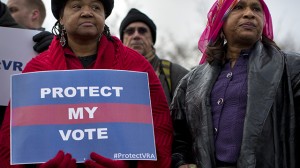
People wait in line outside the Supreme Court in Washington, DC, on Feb. 27, 2013, to listen to oral arguments in the Shelby County, Ala., v. Holder voting rights case. (AP Photo/Evan Vucci)
In the summer of 2012, Pennsylvania House Majority Leader Mike Turzai (R) bragged that the voter ID law he’d helped pass was “gonna allow Governor Romney to win the state of Pennsylvania.” That law was short-lived: a federal judge issued a ruling that, as the New York Times reported, the law “hampered the ability of hundreds of thousands of Pennsylvanians to cast their ballots, with the burden falling most heavily on elderly, disabled and low-income residents, and that the state’s reason for the law — that it was needed to combat voter fraud — was not supported by the facts.”
This summer, Georgia Secretary of State Brian Kemp was caught in a moment of candor when he warned a crowd of fellow Republicans: “The Democrats are working hard… registering all these minority voters that are out there and others that are sitting on the sidelines, [and] if they can do that, they can win these elections in November.”
When the Supreme Court struck down Section 4 of the Voting Rights Act last June, it was an open invitation to states with a history of voting discrimination — previously required to clear voting restrictions with the Department of Justice — to enact laws that made it harder for traditionally Democratic-leaning groups to cast a ballot. The demographic headwinds facing the GOP, rather than the mythical specter of voter fraud, motivated those legislatures to do so with gusto. According to the Brennan Center for Justice, 22 states have enacted new voting restrictions since the Republican “wave” election in 2010. For 15 of them, this November will be the first test.
But the fight for voting rights continues in the courts. On Thursday, Richard Wolf reported for USA Today that a series of challenges to various states’ restrictive voting laws may ultimately send the Voting Rights Act back to the Supreme Court. Wolf writes:
The Supreme Court’s decision last year eliminating a barrier against voting procedure changes in mostly Southern states came with a caveat: Chief Justice John Roberts warned that the Voting Rights Act still included a “permanent, nationwide ban on racial discrimination in voting.”
Now federal courts from Texas to Wisconsin are on the verge of deciding whether Roberts was right — or if what remains of the 1965 law after the Supreme Court’s 2013 ruling is less able to stop states from making it harder to vote.
An appeals court hearing Friday in the Wisconsin case, following a two-week trial in a Texas district court, might point the way back to the Supreme Court. Cases in North Carolina and Ohio also could be headed that way.
Those states and others have made voting more difficult in recent years to combat what they claim are instances of voter fraud. Texas imposed strict new photo identification rules hours after the Supreme Court ruling. North Carolina cut back on early voting, same-day registration and provisional balloting.
They were among 15 states freed in whole or in part from Section 5 of the Voting Rights Act, which requires states with a history of discrimination to clear any changes with the Justice Department. The high court’s decision in Shelby County v. Holder struck down the list of states dating back a half century.
Wisconsin and Ohio were not Section 5 states. But Wisconsin’s list of restrictions and Ohio’s cutback on early voting are targets for the next-best defense against discrimination: Section 2, which puts the burden of proof on victims to prove racial discrimination in voting once changes have been enacted.
“This is a test for how strong Section 2 can be, how strong a bulwark it’s going to be against voting discrimination going forward,” says Wendy Weiser of the Brennan Center for Justice at New York University School of Law. “I think it is highly likely that one or more of those cases will end up before the U.S. Supreme Court at some point.”
There’s more. Read the whole story at USA Today.
This work is licensed under a Creative Commons Attribution-NoDerivatives 4.0 International License.

